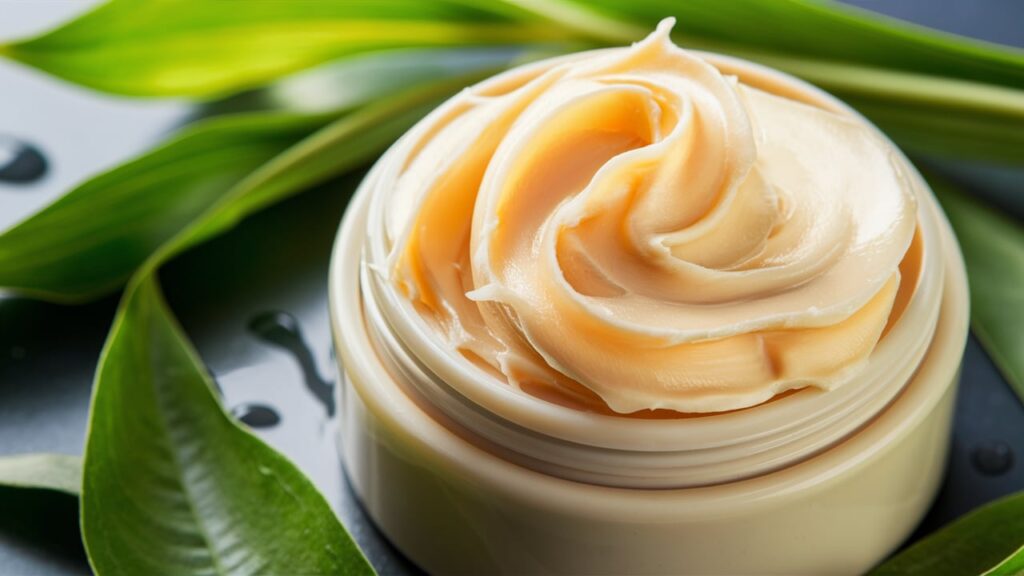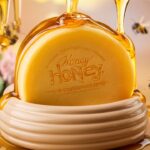Imagine stepping into a world where your skin feels pampered, hydrated, and soft. Picture a soap so rich and creamy, it transforms your everyday shower into a luxurious spa experience.
Welcome to the world of shea butter soap. Known for its exceptional moisturizing properties, shea butter soap is more than just a cleansing bar. It’s a rejuvenating treat for your skin.
Definition and Brief History of Shea Butter
Shea butter is a fatty substance (triglyceride) extracted from the nut of the African shea tree (Vitellaria paradoxa). It’s naturally ivory-colored but sometimes dyed yellow for aesthetic reasons.
The use of shea butter has a long and rich history. Evidence suggests it’s been used for thousands of years, possibly as far back as ancient Egypt.
Traditionally, West African communities have extracted shea butter and used it for its cosmetic and medicinal properties.
It gained wider recognition in the 1800s and today is a popular ingredient in skincare products around the world.
Shea butter adds a luxurious feel and moisturizing properties to soap. Its fatty acids help create a rich lather and cleanse the skin while keeping it soft and hydrated.
You’ll find shea butter in various soap forms; homemade varieties, commercially produced bars, and even liquid soaps.
The amount of shea butter can vary, impacting the soap’s texture and moisturizing level.
Composition of Shea Butter Soap
A shea butter soap recipe is rich in fatty acids, particularly oleic and stearic acid, which contribute to the soap’s creamy texture and moisturizing properties.
Shea butter also boasts vitamins A and E, known for their skin-soothing and antioxidant benefits.
Common lathering agents in shea butter soap include:
Oils:
Olive oil, coconut oil, and palm oil are popular choices, each offering unique cleansing properties and contributing to the soap’s hardness and lather.
Sodium Hydroxide (Lye
This is a necessary but reactive ingredient that undergoes a chemical reaction with the oils, creating soap.
The specific composition of shea butter soap varies depending on the manufacturer.
Soap Secrets: Why Homemade Soaps Are Your Skin’s New Best Friend
Benefits of Shea Butter Soap
Here are the main Shea butter soap benefits based on scientific studies;
Moisturizing Properties
Shea butter is rich in fatty acids, particularly oleic and stearic acid. The fatty acids act as emollients, forming a protective layer on the skin that traps moisture and prevents dehydration.
Shea butter also contains natural humectants, which draw moisture from the deeper layers of the skin, keeping it hydrated.
Vitamins A and E found in shea butter further enhance its moisturizing power. Vitamin A promotes cell turnover, leading to healthier, smoother skin.
Vitamin E, on the other hand, is a potent antioxidant that helps protect the skin from free radical damage, which can contribute to dryness.
When shea butter is combined with other organic soap ingredients, the moisturizing effect is amplified:
Nourishing and Softening the Skin
Shea butter melt and pour soap recipes are richness in fatty acids plays a starring role. The fatty acids act as emollients. Emollients fill in the gaps between skin cells, creating a smooth, protective layer. This layer:
Traps moisture: By preventing evaporation, emollients ensure your skin stays hydrated and supple.
Softens roughness: The emollient layer smooths out rough patches, leaving your skin feeling silky and soft.
Beyond emollients, shea butter offers additional nourishment for your skin:
Vitamin A in shea butter promotes cell turnover, encouraging the production of new skin cells. The result is a healthier, smoother skin with a youthful appearance.
Shea butter’s benefits extend beyond nourishment and softening. It possesses anti-inflammatory properties that can help soothe skin concerns like dryness and eczema:
Healing Properties for Skin Conditions
Shea butter soap has anti-inflammatory properties due to the presence of compounds like cinnamic acid and lupeol. These compounds can help:
Reduce redness and swelling:
Shea butter can soothe the discomfort associated with conditions like eczema, psoriasis, and insect bites.
Promote wound healing:
Studies suggest shea butter may accelerate wound healing by stimulating collagen production and reducing inflammation.
Dryness often exacerbates skin conditions. Shea butter’s richness in fatty acids and vitamins makes it a potent moisturizer.
Shea butter forms a protective barrier on the skin, trapping moisture and preventing further dryness.
Suitable for all skin types
Unlike some botanical extracts, shea butter is unlikely to irritate the skin.
Shea butter has a comedogenic rating of 0-2, meaning it’s unlikely to clog pores. This makes it a good choice for those with acne-prone skin.
It also has anti-inflammatory properties that help calm irritation caused by dryness or other skin conditions. Research also shows that shea butter may have anti-ageing.
How to Choose the Best Shea Butter Soap
Look for soaps with a high percentage of shea butter (ideally 20% or more) to reap the full benefits of its moisturizing and nourishing properties.
Opt for soaps with natural lathering agents like olive oil or coconut oil. These are gentler on the skin compared to harsh detergents.
Be mindful of added ingredients. Fragrances, artificial colors, and harsh chemicals can irritate sensitive skin. Opt for soaps with natural ingredients like essential oils for a delightful scent and minimal irritation.
Cold-pressed shea butter soaps are known to retain more of the shea butter’s natural benefits
Bonus Tip:
Shea butter soap can be quite moisturizing, so consider using it primarily for body cleansing. For facial cleansing, a gentler cleanser might be more suitable depending on your skin type.
Skincare Routine Incorporating Shea Butter Soap
Shea butter soap is known for its moisturizing and nourishing properties, making it ideal for dry or sensitive skin. Here’s how you can include it in your daily skincare regimen:
- Cleansing: Start your routine by using shea butter soap to wash your face and body. Use lukewarm water to avoid stripping the skin of its natural oils
- Gentle Motion: Apply the soap in a gentle, circular motion to cleanse without damaging the skin
- Rinsing: Rinse thoroughly to remove all soap residue, which can cause irritation if left on the skin
- Moisturizing: After cleansing, apply a moisturizer to lock in hydration, as shea butter helps to maintain skin moisture
- Storage: Store the soap in a cool, dry place to keep it fresh and effective
Expert opinion
Dr. Dray, a licensed dermatologist in the United States, explains that shea butter is commonly found in various skincare products, including prescription moisturizers for conditions like eczema and seborrheic dermatitis.
She mentions that while shea butter is a good occlusive and emollient, it lacks humectants to hold onto water in the skin.
Dr. Dray emphasizes that shea butter can be used as a moisturizer for dry patches on the body, but may be difficult to work with in its raw form due to its texture.
Overall, she recommends using shea butter products for their moisturizing and barrier-protecting properties, especially for individuals with skin conditions like eczema.
Precautions and Tips for Usage
While generally gentle, shea butter can cause irritation in some individuals. Patch testing on a small area of your forearm is crucial, especially if you have sensitive skin. Discontinue use if you experience redness, itching, or burning.
Shea butter has a comedogenic rating of 0-2, meaning it’s unlikely to clog pores. However, if you have acne-prone skin, monitor your skin’s reaction.
You might want to opt for a shea butter soap with a lower percentage of shea butter or use it only on your body.
Be mindful of additional ingredients in shea butter soap. Fragrances, artificial colors, and harsh chemicals can irritate sensitive skin. Opt for soaps with natural ingredients and minimal additives.
User reviews and testimonials
- Users find shea butter excellent for softening and moisturizing skin.
- Testimonials also emphasize the product’s smooth application and moisturizing benefits, particularly for dry skin.
- A majority of Amazon customers appreciate the raw shea butter’s quality for DIY skin creams, noting its effectiveness for dry skin and positive impact on skin texture.
Frequently asked questions
What is shea butter soap?
Shea butter soap is a type of soap that includes shea butter as a primary ingredient. Shea butter is a fat extracted from the nuts of the shea tree, native to Africa. It is known for its moisturizing and healing properties, making it a popular ingredient in skincare products.
What are the benefits of using shea butter soap?
Shea butter soap offers numerous benefits, including:
- Deep hydration and miniaturization
- Anti-inflammatory properties that can soothe skin irritations
- Rich in vitamins A and E, which promote healthy skin
- Can help reduce the appearance of scars and stretch marks
- Gentle and suitable for all skin types, including sensitive skin
Is shea butter soap good for acne-prone skin?
Yes, shea butter soap can be beneficial for acne-prone skin. Its anti-inflammatory and healing properties can help soothe and reduce acne breakouts. Additionally, it provides deep hydration without clogging pores, which is essential for maintaining clear skin.
Can shea butter soap be used on the face?
Yes, shea butter soap is gentle enough to be used on the face. Its moisturizing and nourishing properties make it an excellent choice for facial cleansing, especially for those with dry or sensitive skin
Is shea butter soap suitable for people with sensitive skin?
Shea butter soap is known for its gentle and soothing properties, making it suitable for people with sensitive skin. It helps to nourish and protect the skin without causing irritation.
How often can I use shea butter soap?
You can use shea butter soap daily as part of your skincare routine. It is gentle and moisturizing, making it safe for frequent use on both the face and body.
Does shea butter soap help with eczema and psoriasis?
Shea butter soap can be helpful for managing eczema and psoriasis due to its moisturizing and anti-inflammatory properties. It can help soothe dry, irritated skin and reduce the symptoms associated with these conditions.
Can shea butter soap lighten dark spots?
Shea butter is known to help even out skin tone and reduce the appearance of dark spots over time. Regular use of shea butter soap can contribute to a more balanced complexion and lighter dark spots.
Is shea butter soap safe for babies?
Yes, shea butter soap is generally safe for babies. Its natural and gentle ingredients make it a good choice for their delicate skin. However, it’s always best to do a patch test first and consult with a pediatrician if you have any concerns.
How should I store shea butter soap to make it last longer?
To extend the life of your shea butter soap, store it in a cool, dry place between uses. Use a soap dish with drainage to prevent the soap from sitting in water, which can cause it to dissolve faster.
Can shea butter soap help with dry skin?
Yes, shea butter soap is excellent for dry skin. Its rich, moisturizing properties help to hydrate and nourish the skin, leaving it soft and smooth.
Does shea butter soap have a scent?
Shea butter soap can have a mild, natural scent, but it is often lightly fragranced with essential oils or other natural scents. Unscented options are also available for those who prefer a fragrance-free product.
Can shea butter soap be used as a shaving soap?
Shea butter soap can be used as a shaving soap. Its creamy lather and moisturizing properties make it a great option for shaving, helping to protect and hydrate the skin during and after shaving.
Incorporating shea butter soap into your daily routine isn’t just about cleansing. It’s about embracing a skincare revolution that prioritizes nourishment and natural beauty.
With each use, you’ll feel the difference as your skin becomes softer, smoother, and more radiant. Say goodbye to dryness and hello to a luxurious, spa-like experience every day.
Ready to transform your skincare routine? Let shea butter soap lead the way to a healthier, more vibrant you.

I’m a devoted organic skincare enthusiast, passionate about the natural, wholesome goodness that organic products bring to our skin.
Organic skincare isn’t just a hobby for me—it’s a lifestyle. Every product I use, recommend, and write about has been carefully chosen for its purity and effectiveness. Everything I write about is backed by scientific studies, dermatologists’ opinions, and user experiences.
I also excel at tackling skincare challenges with innovative, organic solutions.

